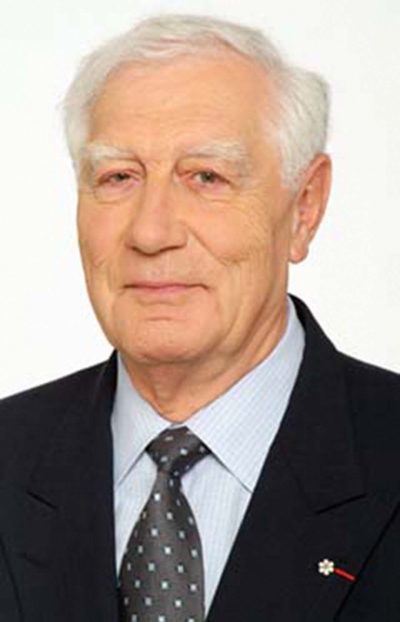
Pierre J. Jeanniot, O.C., C.Q., B.Sc., LL.D, D.Sc.
Associate Researcher
Having held various senior positions at Air Canada, Pierre Jeanniot was President and CEO from 1984-1990. He directed its privatization and led the newly privatized airline as its first CEO. He was subsequently appointed Director General and CEO of the International Air Transport Association (IATA) in 1993 and was granted the lifetime title of Director General Emeritus in recognition of his outstanding contribution to international civil aviation in 2002. Pierre Jeanniot is currently Chairman of Thales Canada Inc., a subsidiary of the international “Groupe Thales.” He is also President of Jinmag Inc., a consulting and investment company which provides advice to governments, civil aviation authorities, airlines and other aviation-related companies. He serves on a number of Boards including subsidiaries of Scotia Bank, SECOR Consulting, and diverse aviation-related companies, and is Chancellor of the University of Québec in Montreal (UQAM). Awards received: Officer of the Order of Canada, Chevalier de la Légion d’Honneur (France); the Independence Medal of the First Order (Jordan); Commander of l’Ordre du Québec; Doctorate Honoris Causa, University of Québec; Honorary Doctorate of International Law, Concordia University; and Management Achievement Award, Faculty of Management, and Doctorate of Science, Honoris Causa, McGill University.

Séminaire IEDM/Institut Fraser
MEI/Fraser Institute Public Policy Seminar

Éric Grenon
Associate Researcher at the MEI
Éric Grenon, économiste agricole, M.Sc., MBA., a étudié à la Faculté des sciences de l'agriculture et de l'alimentation (FSAA) de 1983 à 1990 où il a obtenu un baccalauréat en agroéconomie et une maîtrise en économie rurale. Il détient une maîtrise en administration des affaires de l’École des Hautes études commerciales de Montréal (1997).

Dominique Vachon
Dominique Vachon is a consultant in business strategy and an associate economist with the Montreal Economic Institute. Ms. Vachon was senior economist and later chief economist and vice president of the National Bank of Canada from 1991 to 2002. She is an experienced analyst and for six years wrote a weekly column in the business newspaper Les Affaires. She was also a regular participant in public affairs programs, including Les affaires et la vie on Radio-Canada, where she was an economic commentator. In 1997, she was awarded the “Prix Femme d’affaires” by the Board of Trade of Metropolitan Montreal. She completed her doctoral studies in finance at HEC Montréal and holds a master’s degree in economics from the University of Montreal.
(High resolution photography)

Gérard Deltell
Leader, Action démocratique du Québec
Gérard Deltell worked as a journalist for over 20 years. He was a correspondent at the National Assembly for six years. After his election as MNA for the district of Chauveau in 2008, Mr. Deltell became leader of the Action démocratique du Québec on November 19, 2009. Native from the Quebec City region, and passionated by history and aviation, Gérard Deltell is described as a frank and direct person.

Michel Kelly-Gagnon
Michel was one of the cofounders of the Amis de la Liberté (Friends of Liberty) in the mid-1990s, and helped relaunch the MEI as of 1997, notably thanks to his skills as a fundraiser. After having been head of the MEI from 1999 to 2006, Michel was president of the Quebec Employers Council from March 2006 to December 2008, and came back at the helm of the MEI from January 2009 to April 2023. Early in his career, he practised law and then became an entrepreneur in the field of specialized business training. He served on the executive committee of the board of directors of the Quebec Workers Compensation Board (CSST) from 2006 to 2009. He was one of six Quebecers honoured in Canada’s Top 40 Under 40™ 2008 awards. The winners were chosen from among 1,100 nominees.
Over the years, he has served on several boards of directors, including that of the Canada Foundation for Innovation, which disburses several hundred million dollars a year in order to finance Canada’s scientific research infrastructure. He is also a Senior Fellow at the Atlas Network, as well as at the Frontier Centre for Public Policy and, finally, a Trustee of The John Dobson Foundation, which supports the teaching of entrepreneurial and free enterprise thinking to the general public. Michel is Founding President of the MEI since April 2023.
These two press releases (here and here) summarize the transition of management that took place at the MEI in 2023.

Paul Daniel Muller
Paul Daniel Muller was President of the MEI from September 2006 to November 2008.

Stephen Goldsmith
Indianapolis mayor
Mayor Goldsmith spoke of what it was like to be elected in the early 90s as a cost-cutting, privatizing mayor faced with a decaying city infrastructure and distrustful unions. Realizing the depth of the problem he had assumed, Goldsmith talked with business leaders and city workers to find a way out of Indianapolis difficulties. In the course of these discussions, Goldsmith was challenged by city workers on his belief that the private sector could provide better service cheaper than they could, that in effect he didn’t understand what their jobs actually entailed. Goldsmith responded in a manner unusual for an elected official – he agreed to spend time working alongside municipal employees in order to see their point of view. It was during this experience that an epiphany came to Goldsmith: the problem in city governance wasn’t that city services were run by public sector employees, but rather that municipal services were bogged down by a bureaucratic, unresponsive top-down management system. Good ideas to improve the way in which the city function existed, but they couldn’t be heard and thus acted upon.

Johan Hjertqvist
Johan Hjertqvist is manager of the Timbro Health Unit.
Way ahead of Canada’s debates on the future of health care, Sweden, in the early 1990s, was already implementing a reform by which the private sector played a greater role in the health care system. What could the Romanow Commission – currently holding public hearings across Canada – learn from the public-private partnerships implemented in the Swedish system? How has Sweden succeeded in reconciling universal access to health care with a greater role for private providers of medical and hospital services? Why is the Swedish National Nurses Union actively supporting this partial privatization? How does partial privatization contribute to shorten waiting lists while also reducing costs and improving the quality of health care? Johan Hjertqvist is the manager of Timbro Health Unit, a division of the Timbro Policy Group, a Swedish institute for public policy research. Since 1999 he leads a project analysing the transformation of health care in the Stockholm region. He is currently preparing a book (to be published in 2002) which will describe Swedish health care reform for an international audience. Mr. Hjertqvist also acts as an advisor on public-private partnerships to the Greater Stockholm Council. Mr. Hjertqvist’s presentation was followed by a question period open to the audience.

Pierre Lemieux
Senior Fellow
Pierre Lemieux is an economist who has published many books on economic and political issues. In addition to his many academic articles (including the article on property rights he coauthored in the Dictionnaire des sciences économiques of the Presses Universitaires de France), he has signed several articles in the international financial press and has also chaired several international academic seminars. He holds a M.A. in philosophy from the Université de Sherbrooke and a M.A. in economics from the University of Toronto. He is affiliated with the Department of Management Sciences of the Université du Québec en Outaouais.

